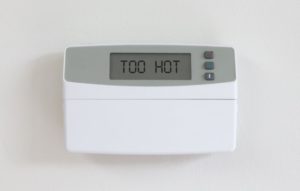
For some people, falling and staying asleep is easy, but for you…not so much. After being diagnosed with sleep apnea, your bedtime routine suddenly got a lot more involved, but there may be something you haven’t considered—the temperature of your bedroom. It’s one of the most important factors when it comes to quality sleep, and making sure it’s just right can mean the difference between waking up feeling energized or just wanting to stay in bed.
The Relationship Between Sleep & Temperature
While the human body doesn’t look like it’s doing much when we sleep, it’s actually extremely busy throughout the night. Several essential processes only occur while you’re catching Z’s that contribute to your energy level each day as well as your mental and physical health. Of course, the body doesn’t just automatically fall asleep like turning off a light switch. Certain conditions have to be met, such as being in a comfortable, quiet, and dark place.
However, sleep has one more requirement—your body temperature has to drop slightly. This happens naturally as you fall asleep. So, as you can imagine, having a bedroom that’s on the cooler side (about 60-67 degrees) can help this and enable you to conk out nice and fast.
Heat is Not Your Friend
Unfortunately, too much heat can make sleep difficult because it prevents the body from doing the necessary cooling. You’ve probably had the unpleasant experience of trying to sleep in a room that was too hot or having a blanket that was too heavy for the weather. Excess heat makes sleep harder for everyone, but it can be especially detrimental for those dealing with sleep apnea.
How to Stay Cool
You don’t have to be cold to enjoy quality sleep, just comfortably cool. Turning on a fan, turning down the thermostat, and using a lighter blanket can help with this. Another tip is to take a warm shower right before bed. The hot water will cause your body to naturally start cooling itself, which will kickstart the process necessary for sleep.
Temperature Isn’t Everything
Of course, while lowering bedroom temperature can help improve sleep, it shouldn’t substitute for professional sleep apnea treatment for those who need it. People who think they might have this condition should seek out a diagnosis and treatment, and combining their doctor’s recommendations with the right temperature will ensure they fall asleep quickly and wake up feeling eager to face the day.
About the Author
Cedric C. Chenet, DDS, PA is led by three skilled dentists who work together to provide a full range of services to Melbourne and the surrounding communities, including sleep apnea treatment. By incorporating their expertise, technical skills, and the latest technology, they can help you take back control of your sleep without having to rely on a bulky CPAP machine. If you’re interested in sleep apnea treatment, you can request an appointment through our website or call (321) 253-3136.
